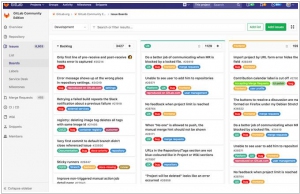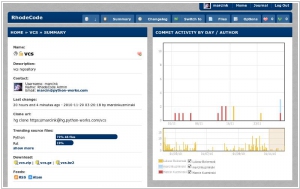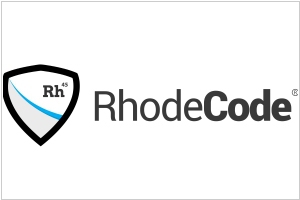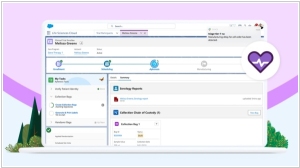Gitlab vs RhodeCode
May 22, 2023 | Author: Michael Stromann
14

GitLab offers git repository management, code reviews, issue tracking, activity feeds and wiki’s. Enterprises install GitLab on-premise and connect it with LDAP and Active Directory servers for secure authentication and authorization. A single GitLab server can handle more than 25,000 users but it is also possible to create a high availability setup with a multiple active servers.
6

RhodeCode Enterprise is the secure collaboration environment that works the way you do — with your workflows, your permissions, on your platforms. Safely tucked behind your firewall. Increased project security and permissions control along with real-time repository news feeds give managers a birds eye view on project progress and complete control over access to highly sensitive data, driving projects to come in on-time and under budget with no compromise on either productivity or security.
GitLab and RhodeCode are both platforms for hosting and managing code repositories using the Git version control system, but they have some key differences.
GitLab is a comprehensive DevOps platform that provides not only code repository hosting but also a wide range of features for the entire development lifecycle. It offers built-in CI/CD pipelines, issue tracking, project management, and collaboration tools. GitLab also has an active community and a robust ecosystem of integrations and extensions. It can be deployed both as a self-hosted solution and as a cloud-based service.
RhodeCode, on the other hand, is a code management platform focused on providing centralized control and security for code repositories. It offers advanced access controls, including fine-grained permissions and code review workflows. RhodeCode also provides comprehensive audit logs and compliance features, making it suitable for organizations with strict security and governance requirements. It can be deployed as a self-hosted solution or used in the cloud.
See also: Top 10 Issue Trackers
GitLab is a comprehensive DevOps platform that provides not only code repository hosting but also a wide range of features for the entire development lifecycle. It offers built-in CI/CD pipelines, issue tracking, project management, and collaboration tools. GitLab also has an active community and a robust ecosystem of integrations and extensions. It can be deployed both as a self-hosted solution and as a cloud-based service.
RhodeCode, on the other hand, is a code management platform focused on providing centralized control and security for code repositories. It offers advanced access controls, including fine-grained permissions and code review workflows. RhodeCode also provides comprehensive audit logs and compliance features, making it suitable for organizations with strict security and governance requirements. It can be deployed as a self-hosted solution or used in the cloud.
See also: Top 10 Issue Trackers
Gitlab vs RhodeCode in our news:
2015. Collaboration platform for developers GitLab raises $4M

GitLab, the open source Git-based collaboration platform for developers, has announced that it successfully secured $4 million in Series A funding. The company provides a free community edition, a free SaaS version, and a paid enterprise edition of its service. With the newly acquired funding, GitLab aims to expedite its growth and expand its global operations. Git has become the go-to method for code management among numerous development teams. While GitHub stands as the most well-known Git-hosting service, there exist several competitors in this realm, each offering their own unique approach and user interface on top of the fundamental hosted Git concept. Atlassian, for instance, provides both free and paid Git hosting services. What sets GitLab apart from some of these competitors is its strong emphasis on its open source solution.
2014. Enterprise code management service RhodeCode get $3.5M funding

The Berlin-based company, RhodeCode, which specializes in behind-the-firewall application lifecycle management, has successfully secured $3.5 million in funding. Initially positioned as a direct competitor to platforms like GitHub, RhodeCode realized that its primary customer base consisted of large enterprises, including the U.S. Navy and Department of Energy. These organizations were hesitant to store their valuable code in the public cloud. As a result, RhodeCode made the strategic decision to discontinue its software-as-a-service offering and shift its focus towards the behind-the-firewall RhodeCode Enterprise product. This change allows the company to cater specifically to the needs of enterprises seeking secure and private code management solutions.


